Forum: Ann Arbor Districts for County Board
Of the six candidates running in three Ann Arbor districts for the Washtenaw County board of commissioners, only the three Democrats – Andy LaBarre, and incumbents Yousef Rabhi and Conan Smith – attended the Oct. 10 candidate forum moderated by the League of Women Voters of the Ann Arbor Area.
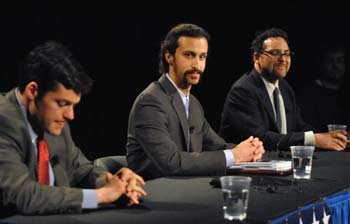
From left: Democrats Andy LaBarre, Yousef Rabhi, and Conan Smith await the start of the Oct. 10 League of Women Voters candidate forum. The Republican candidates for Districts 7, 8 and 9 in the Washtenaw County board of commissioner races did not attend the event. (Photos by the writer.)
Due to redistricting that takes effect this election cycle, the county board will shrink from 11 districts to 9. Ann Arbor is currently represented by four commissioners, but will have three main districts – 7, 8 and 9 – in the newly constituted board starting in January 2013. [.pdf file of 9-district county map] District 2 will also include a small portion of Ann Arbor, but the incumbent in that district, Republican Dan Smith, is unopposed in the Nov. 6 general election.
In District 7, Andy LaBarre won the Democratic primary and will face Republican David Parker in November. The incumbent, Barbara Bergman, is not seeking re-election.
The incumbent in District 8, Democrat Yousef Rabhi, is running against Republican Joe Baublis and seeking his second term in office. And in District 9, Conan Smith – a Democrat who was first elected in 2004 and has served as board chair over the past two years – faces Republican John Floyd.
In various ways, the Ann Arbor Democrats running for the county board expressed their views that government can be a positive force in people’s lives. LaBarre stressed support for human services, parkland and public transit, while Rabhi emphasized the importance of building a resilient, sustainable community. Smith cited the role of the county board as a convener of community leaders, bringing together people throughout the county to tackle problems like the “human and economic calamity” in Ypsilanti and Ypsilanti Township. Smith also noted that he expects the new board for the first time will have a majority of commissioners under 50 years old, and will be a “majority minority” board – with more racial diversity than in the past.
All terms for county commissioner are for two years, beginning in January of 2013. Several other district races are contested for the county board, but the League of Women Voters forum included only the Ann Arbor districts. That’s a function of the venue. The forum was held at the studios of Community Television Network in Ann Arbor, and is available online via CTN’s video-on-demand service. Information on local elections can be found on the Washtenaw County clerk’s elections division website. To see a sample ballot for your precinct, visit the Secretary of State’s website.
Opening Statements
Each candidate was given one minute to make an opening statement.
Andy LaBarre: He began by thanking the league and noting that the district he’s running to represent (District 7) includes portions of eastern and northern Ann Arbor. He cited three main reasons for running. The first is to try to improve on the county’s human services system. The second reason is to build on the county’s work in preserving its green spaces, and to ensure that people have access to vital parkland throughout the county. The last reason is to ensure that the county has a budget that continues to reflect the values of residents in Washtenaw County. He’s a native of the county and grew up here. He hopes to give back to the community.

The three main Ann Arbor districts in the new district map of the Washtenaw County board of commissioners, which was adopted by the county apportionment commission last year. This is the first election cycle for the redistricted county board, which will drop from 11 to 9 districts.
Yousef Rabhi: He also thanked the league and viewers, saying it’s important to be informed about how local government works. A lot of important decisions are made at the local level. He was born in Ypsilanti and grew up in Ann Arbor, and has lived here his whole life. He’s seen the community’s many strengths, and in this tough economic time, he saw the community come together to make some tough decisions. The county went through a strenuous budget process, he said, and the board ended up balancing a budget that had originally projected a $17 million shortfall for this year. The unions came together, the different departments came together, the entire community came together to make that happen, he said. He’s proud of the accomplishments they’ve made, and he hopes the voters of District 8 will return him for a second term.
Conan Smith: Smith echoed the comments of thanks to the league. He described the county level as a somewhat invisible layer of government, noting that it’s important to understand what values drive the decisions that are made at the county board of commissioners. He’s also a lifelong resident of Washtenaw County, and said he hopes to die here – he lives in his grandparents’ house. He said he’s been honored to serve as chair of the board for the last two years, and to have chaired the budget committee for two years before that, as the county first began its serious struggle with the declining economy. Throughout that process, he said he helped the county maintain a keen focus on human services, protecting our environment and rebuilding prosperity through economic development programs. “We’ve got a long way to go yet,” he added, and he hoped they would be able to talk about some of those issues later in the forum.
Experience
Why have you chosen to run for county commissioner? What education and experiences make you well-qualified for this position?
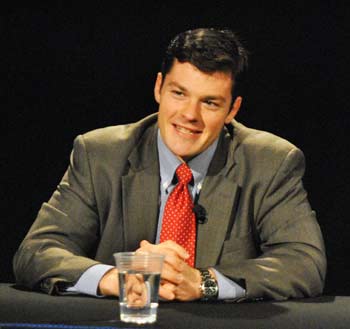
Andy LaBarre, candidate for the Washtenaw County board of commissioners in District 7, representing parts of northern and eastern Ann Arbor.
Andy LaBarre: He said he liked to think his undergraduate degree, with a major in political science, and his master’s degree in public administration help qualify him from an educational standpoint. For six years he worked for Congressman John Dingell, including two years as his district administrator running the Michigan offices. Now he’s the vice president for government relations at the Ann Arbor Ypsilanti Regional Chamber of Commerce. He again cited his three reasons for running: Strengthening human services, protecting the environment and parkland, and ensuring that the community’s values are promoted in the county budget. He felt that Conan Smith had said it well when Smith had described county government as often invisible – but it’s very important. The county does a great job, LaBarre said, and he thinks they can do an even better job in the future.
Yousef Rabhi: Having grown up in Washtenaw County, Rabhi feels he knows this region and the people here. He has a passion to serve locally. When he contested his first primary in 2010, he won by one vote. It shows the passion with which people participate in democracy, he said, and he’s proud to represent this city and county, because they can do so much great work. He’s running because he believes in sustainability. That doesn’t just mean the environment, he added. It also means building a resilient economy in the county – it means economic development. It also involves civil liberties and equality. Those are the values of this community, he said, and the values that he promotes on the county board. He’s had a wonderful first term, and he hopes to come back.
Conan Smith: Saying he loved Rabhi’s story about winning by one vote, Smith noted that his own grandfather – Al Wheeler – won the Ann Arbor mayor’s race in the 1970s by a single vote. [Wheeler was the city's first, and only, black mayor, and was elected in 1975. But it was his re-election in 1977 that resulted in the single-vote victory over Republican Lou Belcher. The election was challenged in court and ultimately led to a special election in 1978 that Wheeler lost to Belcher.] As a young boy at the time, Smith said, that was the beginning of his training in public service.
Smith noted that his family has been in elected office in Washtenaw County for generations. His mother, Alma Wheeler Smith, served as a state senator and state representative, and his wife, Rebekah Warren, is a current state senator representing Ann Arbor. He has served on the county board for six years. As far as education, he has a humanities background, majoring in creative writing at the University of Michigan. He’s now doing master’s degree work at Wayne State University in conflict resolution. The county board is a place with the potential to bring together a variety of diverse perspectives to tackle complex problems, Smith said, whether that’s homelessness, economic decline, or other issues. He believes his skill set around negotiation and building consensus can serve the whole of Washtenaw County.
Duties of the Job
Explain the responsibilities of the job and describe the perfect county commissioner.
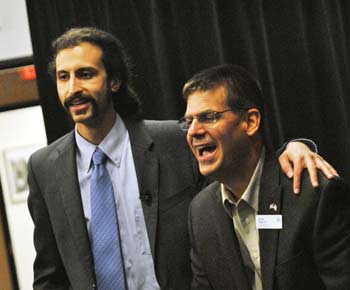
Washtenaw County commissioners, from left: Democrat Yousef Rabhi and Republican Dan Smith. Smith, who represents District 2, is unopposed in the Nov. 6 general election and was simply attending the Oct. 10 candidate forum as an observer.
Yousef Rabhi: The main role is to balance the county budget, he said – that’s the first and foremost responsibility. Beyond that, commissioners must ensure that the county provides services that are mandated by the state. But in Washtenaw County, commissioners have taken on a slightly different role, he said. There’s what they have to do, but also what they can do – because the values of this community are such that they want to provide extra human services, and to be at the forefront of sustainability. So the core function of county government is to balance the budget, he said, but it can be done in a responsible way, and in line with community values.
Conan Smith: There are two things that make a perfect county commissioner, he said. The first is the capacity to bring your values to the table. And as Rabhi had indicated, Smith said, commissioners really need to understand the people they represent and the community at large. The second attribute is the capacity to come with an open mind. That includes listening carefully to the professionals on staff, to the community members who are experiencing challenges that the board is trying to resolve, and to the colleagues who bring different perspectives from a whole array of experiences – so you can work collectively to find the best solutions to those problems. It’s been his long belief that the board is stronger and smarter when they work together, and that no single commissioner has the answer. When they work as a team and learn from each other, Smith said, “we can do amazing things.”
Andy LaBarre: He said that Smith and Rabhi had given great answers. Not having served on the board before, he said he could imagine that the perfect county commissioner would be someone who does the things that have been highlighted in terms of the duties of the job and bringing an open mind to it. He would add that the best thing a commissioner can do is to remember that they represent their district at the county – they don’t represent the county to the district. They serve as a conduit of information to the county and to constituents, not one way or the other all the time.
Customer Service
The role of the government is to provide customer service. What services does the county provide, and how can its service be improved?
Conan Smith: The county is a vast system and provides services across an incredible array of areas, he said. For example, the county is the arbiter of building inspections and health code, and provides services like the jail and corrections through the sheriff’s office. There’s a long list of services that the county provides, he said. But he described the county’s main role as facilitating and convening. The service that county commissioners provide is bringing together local government officials, business and civic leaders into a place where people can decipher problems and resolve them collectively.
Andy LaBarre: All units of government can always do a better job with customer service in terms of listening to citizens and constituents, he said. If you were to judge Washtenaw County against any other county in the state, you’d find that Washtenaw does a remarkable job. So we can build on those existing strengths, he said, and realize that the county government has a “pretty terrific” workforce that excels at what they do and are true professionals. Commissioners can talk to the staff about ways they think that they can provide even better customer assistance.
Yousef Rabhi: He said that LaBarre is right – the basis of good customer service is having staff on the ground who know what they’re doing, who are dedicated and passionate. People don’t work for the county because of the big paychecks, he said. They do it because they’re dedicated to public service. The people working for the county are phenomenal, he said. The county provides excellent service, but there’s always room for improvement. But it’s the staff on the ground who know the best ways to provide even better customer service, he said. “We have dedicated folks working for the county, and I trust them.”
Collaboration
If elected, how would you work with other units of government to reduce redundancies and costs?
Andy LaBarre: He suggested approaching every conversation as a possibility to do that, and keep an open mind about the needs of specific units of government. He’d try to put himself in other people’s place, to the degree that he can, and understand their concerns. You’d keep that issue at the forefront of every conversation. Openness and a willingness to listen will also help, he said.
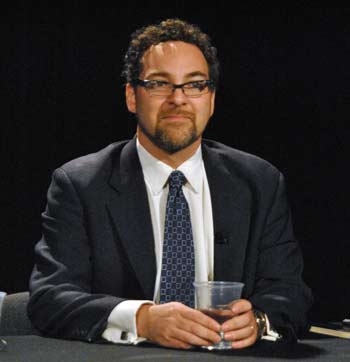
Incumbent Conan Smith, candidate for the Washtenaw County board of commissioners in District 9, representing western Ann Arbor and parts of the city’s north and south sides.
Yousef Rabhi: There’s a lot that the county has already done, he noted. When he first ran for county commissioner, foreseeing that there would be a large budget gap, he was amazed to see what was already being done. During his first term, it’s been amazing to see the work that the county has done to address this issue. One example is the sheriff’s office consolidating the county’s dispatch operations with the city of Ann Arbor. That saved Ann Arbor taxpayers a half million dollars just in the first year, Rabhi said. So they’re working on making government more efficient, consolidating services that will better serve the residents of Washtenaw County.
Conan Smith: Looking at redundancies and costs might be the wrong approach, he began. We ought to be looking at the outcomes that we’re seeking as a community. For example, in land use planning there is a high level of redundancy across all local units of government. The reason is that it’s a very community-centric set of decisions that need to be made, he noted, so that’s OK. Because there is that duplication, it costs more, but it actually serves the people better. The question that we have to ask ourselves always is this, he said: How do we deliver a service in the optimal way that satisfies the citizens? So in the case of dispatch consolidation, that’s an excellent example, he said – better service is being provided through that consolidation. The best decisions – about when to cut, when to invest more, and what services to deliver at what level – are made by keeping the citizen in the forefront, he concluded.
Goals for Next Term
Complete this sentence: If I could achieve one goal in my upcoming term, I would like to …
Yousef Rabhi: He would like to try to eliminate the county’s energy and heating budget. The county government spends about $1 million each year on heating and powering its buildings. The county can make a significant step to reduce the county’s carbon footprint and help balance the budget – if they start investing in renewable energy and in creative ways to bring down that $1 million cost. He realized that eliminating the cost probably isn’t possible, but there’s a lot they can do. Any step the county can take to make its buildings more energy efficient – to install solar hot water heaters or solar panels on the buildings – that will all make a dent, and will have an impact on the budget in the long term, he said. When he ran for office the first time, he said, he talked about the future of Washtenaw County. His decisions on the board aren’t just about today, he said – they’ll also affect the county in 10 or 20 years.
Conan Smith: His single biggest goal is to see the board become a consensus leadership organization. He noted that commissioner Dan Smith, a Republican from the northern part of the county, was in the audience at the CTN studio that night. They come from different value perspectives and experiences, he said, but they have found ways to work together on a number of complex policies. The board hasn’t had enough time to develop “holistic solutions that all the residents of Washtenaw County can see themselves in,” he said. He’d like to see the board work as a team more aggressively on that kind of leadership, so they can present a united front against problems – like poverty on the east side of the county, the environmental issues that Rabhi has raised, and the economic issues that LaBarre had mentioned.
Andy LaBarre: He’d like to try to put in place slight reforms to the way that the county budgets for human services, so that it covers a longer timeframe or broader set of circumstances. For a generation, this county has routinely dedicated funds, time, and resources to human services. Those services are important to the county government and the citizens it serves. In his first term, he’d like to see if the county can provide that service better, more efficiently, and in a way that helps more people get the outcomes they seek.
Fracking
Fracking has come to Washtenaw County. What role should the county play in addressing this issue, in terms of information, regulation and protection for current residents and those in the future?
Background: Fracking is a term used to describe the drilling technique of hydraulic fracturing, used to extract gas and oil. Concerns have been raised recently about the practice coming to Washtenaw County, though it has not yet been used here. See Chronicle coverage: “County Board Tackles ‘Fracking’ Concerns.” The county does not have jurisdiction to regulate the practice.
Conan Smith: The county’s regulatory framework is fairly limited, he said. Smith added that he’d defer to Rabhi, who he said is more versed on this topic. The county’s major role can be around convening community leadership and educating folks about the issues involved with fracking. It’s an obviously destructive practice, he said, and one that perpetuates a carbon-based economy that people are trying to get away from. Anything that can be done to bring alternative practices into play is a big step forward, he said. Reducing reliance on natural gas and oil by increasing the availability of renewable energy in the community and the government’s use of renewables is one good step, for example. Also, he added, the county can help funnel citizens and civic leaders to the appropriate people at the state level who have the tools to address these issues.
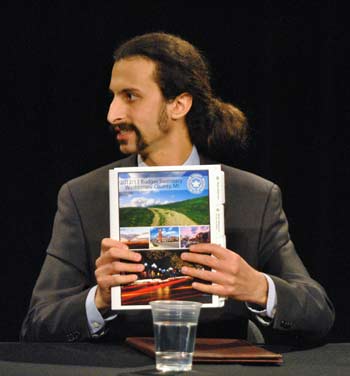
Yousef Rabhi, incumbent Democrat for District 8, brought a copy of the county’s budget summary to the Oct. 10 candidate debate. District 8 includes much of central Ann Arbor.
Andy LaBarre: The county board should act as a way to get information out, he said. Fracking is remarkable in that liberals, conservatives and people all across the political spectrum don’t want it happening locally, he noted. It’s the wrong way to go in terms of energy development, he said – doing what’s been done for 150 years, but expecting new results. The county can funnel pressure on people in the state house and senate to act on the issue, he said. He said he knows there are some legislators who recognize fracking for what it is and are looking to put an end to it. He joked that he had a sneaking suspicion he was sitting at the table with someone who’s married to such a legislator. [Conan Smith's wife is state Sen. Rebekah Warren.]
Yousef Rabhi: Saying he agreed with LaBarre and Smith, Rabhi said that if the county did have a role in setting policy, he’d be in favor of banning fracking in Washtenaw County today. It’s not a good practice, and isn’t good for the future of the world, he said.
Michigan is guardian of the world’s largest fresh water supply, he noted, so it’s not good to be using fracking as a practice that’s so destructive of the water supply. Unfortunately, at the county level not much can be done from a regulatory perspective, he said. But they can do a lot in terms of educating the citizenry about the effects of fracking. It’s come to light is that companies that are trying to frack are going door-to-door and handing people checks in exchange for mineral rights. The county needs to let people know the effects that this will have in the future. He noted that as chair of the board’s working session, he convened a session about fracking earlier this year. He brought in four representatives from different sectors to discuss the issue. It’s an ongoing issue, and the board needs to keep the discussion going, he concluded.
Regional Efforts
What’s the county’s role within southeast Michigan? What does Washtenaw County have to give or gain from regional relationships?
Andy LaBarre: We have a lot to give, he said. It was heartening to see Conan Smith at this summer’s Mackinac policy conference, he said, representing Washtenaw County at the table with Macomb County, Oakland County, Wayne County and Detroit. Southeast Michigan won’t prosper without Washtenaw County’s involvement, he said. The county brings brainpower, a willingness to work – a lot of unique things to the region. The more that Washtenaw County can engage the region, and the more that others in the region can participate in that, “the better off we’ll all be.” It could be specific projects like the Detroit Region Aerotropolis or public transportation, or it might be things like how to share educational resources among the various communities. Washtenaw County must assert itself in a good way as a full and valued partner, he said.
Yousef Rabhi: If you look at a density map of the region, you see the cities of Detroit and Ann Arbor are the two core urban areas of the region, Rabhi said. That should be very meaningful. As the county participates on a regional scale, “we have to understand that our values aren’t going to be the same values as the folks we’re participating with,” he said. “It’s going to be a struggle – it has been a struggle.” But as long as Washtenaw County representatives can stand up for their values and participate in the regional process, he added, they can help impact the whole region. If they can be leaders and teach people about the priorities of this county – things like alternative transit and green infrastructure – that will help move this region forward. Those are the things we’re doing well in Washtenaw County, he said, “and we need to share that with the rest of the region.”
Conan Smith: This issue is one that he’s been proud to see Washtenaw County grow over the last three or four years. The county was an outlier for metro Detroit for a long time, and now they’re at the center table or center stage, in some cases. Washtenaw County really is the crucible of talent for metro Detroit, he said. The University of Michigan draws young, brilliant people from all over the country here, and trains them to be the best in the world for their field. Then because of the lack of connectivity to the rest of the metro area, he said, those kids move off to Austin or Chicago, San Francisco or Miami – “anywhere but Detroit, unfortunately.” So Washtenaw County’s connectivity to Detroit is all about keeping talent here. That talent turns the county into a regional and state “prosperity center,” he said, and it translates the state of Michigan and the metro Detroit area into a national and global economic powerhouse.
Open-Ended Question
What question wasn’t asked tonight that you’d like to address?
Yousef Rabhi: He wanted to pose this question: How can we continue to provide excellent human services in Washtenaw County? The answer is by continuing strong partnerships with the local nonprofit service providers, he said. For every dollar of county resources that is spent or contributed to nonprofit service providers, the county can make $12 of services available. That’s a great investment in the community, he said, and a great partnership that’s been going on for a long time. Those partnerships need to be built even stronger, and he hopes to continue that effort. The county has an integral role in helping provide those human services to county residents. He noted that his opponent in the election believes that the private sector is the best way to deal with human services. “I think that’s absolutely false,” he said. The private sector is profit-driven. How can you make a profit off of homelessness or hunger, off of people who are struggling? That’s not the right route, he concluded.
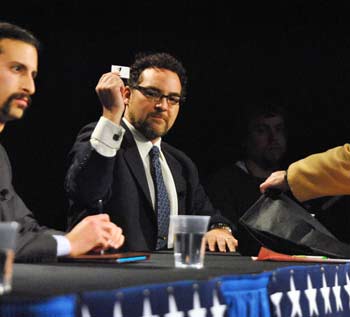
Conan Smith draws a number to determine the speaking order of the candidate forum. To the left is Yousef Rabhi.
Conan Smith: How do we tackle the “intensifying human and economic calamity” that’s happening on the east side of Washtenaw County? In the city of Ypsilanti and Ypsilanti Township, there have been massive job losses and incredible declines in property values, he noted. The ability of those communities to provide the core services that people have come to rely on has been nearly obliterated. The county has a very important role in convening the forces that can turn that boat around, Smith said. It might mean leveraging the county’s own human services investments around poverty and hunger, or pulling together the economic development expertise at Ann Arbor SPARK or the downtown development authorities. It might mean just being an ear for folks who are having serious problems, he added, and connecting them to resources that all units of government – national, state and local – have to offer. Smith said we’ve got to put more of our energy, resources and attention toward those two communities, “which are in very, very dire straits.”
Andy LaBarre: He wished he’d been asked if he were a supporter of countywide transit. “I would have said yes, I am.” He also highlighted what Smith and Rabhi had said in terms of the community’s needs, and the ability to build up the economy on the county’s east side and in other areas. Part of the solution involves a viable countywide transit system, he said. “That’s something worth fighting for.” It’s worth talking to the public about the benefits and costs, and why it’s an investment worth making. He hopes to get a chance to help do that as a commissioner.
Closing Statements
Each candidate had the opportunity to make a two-minute closing statement.
Andy LaBarre: If you watched the entire forum, you would have seen a lot of agreement between him and the incumbents. That’s not to say that they won’t have disagreements in the future, but one common bond they have is a belief that county government can be a very positive force in people’s lives. It can help them do great things as a county and as a community, he said. He’d work hard to make sure that happens. As a county commissioner, he wants to be someone who’s approachable to residents, who listens to them, and always tells them the truth – “even when it’s something that perhaps they don’t want to hear.” When it’s the truth, it needs to be said.
He looks forward to the last month of this campaign. “I look forward to the day after the campaign very much as well.” Between now and then, he hopes to talk with more voters, explain his positions, hear their thoughts and concerns. If he’s successful, he hopes they’ll look back in a year or two and feel they made the right choice in electing him.
Yousef Rabhi: For his first term, Rabhi said he’s been humbled to serve the people of his district. It’s been a phenomenal experience, he’s loved it and he hopes to come back for another two years. He noted that in his opening statement he talked about sustainability, and he wants to continue that theme, and also about what makes a resilient community. An earlier question asked how his educational background applied to the job of county commissioner. He said he didn’t answer it then because he wanted to save it for his closing statement.
He studied at the University of Michigan, focused on the environment, “so I studied sustainability every day. “But it wasn’t just about the science of sustainability. It was about the social science and the humanities behind how we create a sustainable future.” He learned that there are three pillars to sustainability: economic, environmental and social. That’s at the core of why he’s running. He hopes to create a more resilient community through economic development, investing with funds from Act 88, developing strong economies on the county’s east side and in the county’s agricultural communities.
Regarding environmental sustainability, the county can invest in green energy and alternative energy installations on county buildings. And social justice means making sure that the county provides equal services to all residents in the county. At this forum, he noted, three people are running for county commissioner – who come from different backgrounds. LaBarre works at the chamber, coming from an economic development background. Rabhi cited his own background in sustainability, and pointed to Smith’s background in the humanities, a perspective on human services and social justice. “This is a great group of people,” Rabhi said, and he hoped residents in their respective districts would consider supporting each of them.
Conan Smith: Smith began by saying it’s always great to be on stage with Rabhi. “He is a real gentleman.” Smith is finishing his eighth year on the board, and said he’s hopeful that he can come back and be a part of the next board. It will be a very different board of commissioners, he noted. The group is certain to lose Leah Gunn and Barbara Bergman. Both women have given more than a decade of service to the board, and are not running for re-election. He described them as extraordinary women who have provided leadership through the hardest times. For the first time, to his knowledge, the board will have a majority of commissioners under the age of 50, he said, and it will be a “majority minority” board. It will be a very different set of perspectives brought to bear on the issues that the board has been grappling with.
That said, he added, the board is shaping up to be an extraordinary set of leaders that he’s eager to be a part of. Both LaBarre and Rabhi have a great vision of what Washtenaw County can be as a government and as a facilitator, he said. They share a core set of values that’s echoed by Democrats and Republicans alike on the county board, as it relates to taking care of people who are most in need throughout the county. He’s been impressed by his colleagues over the past two years, and expects even more from the board next year. He hopes to be among them, and asked residents on the west side of Ann Arbor for their vote.
The Chronicle would not survive without regular voluntary subscriptions to support our coverage of local government – we hope you elect to subscribe. Click this link for details: Subscribe to The Chronicle. And if you’re already supporting us, please encourage your friends, neighbors and colleagues to help support The Chronicle, too!




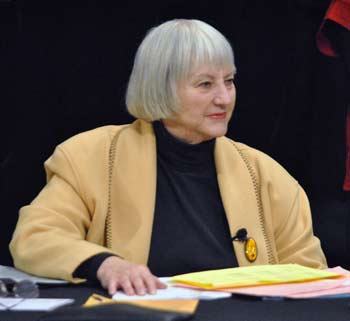
fracking but not dioxane. it’s interesting to see what’s “hot” in environmentalism. talk about what might happen, and don’t talk about what has happened.
If the Republican candidates don’t care enough to come to the forum, why should we care enough to vote for them?